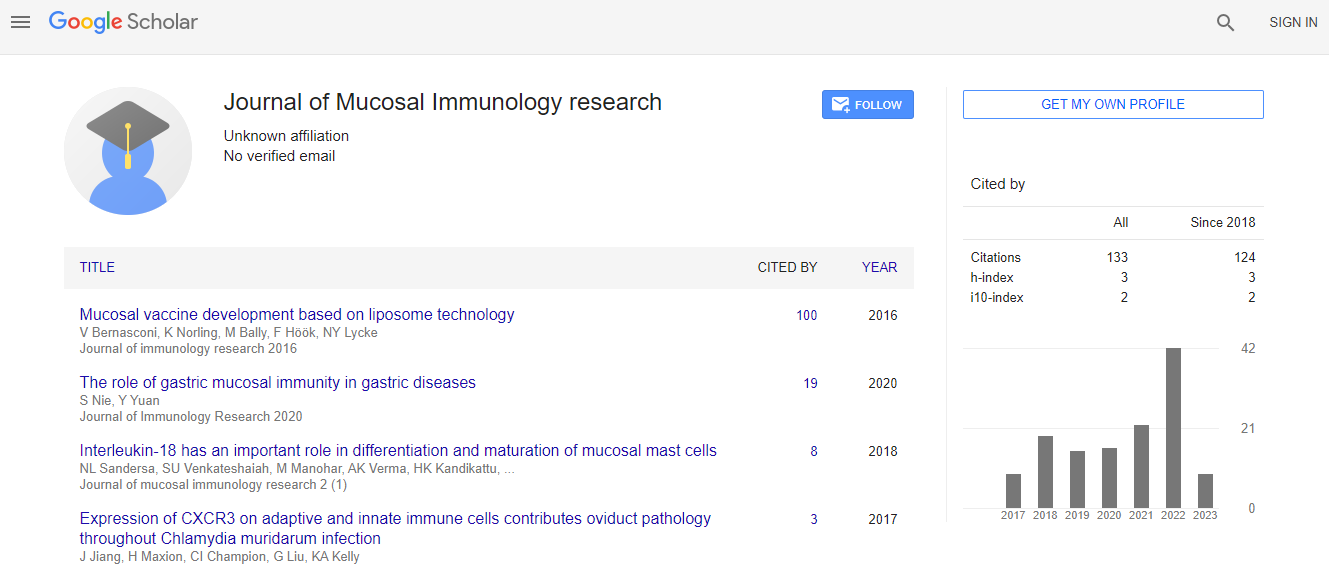Our Group organises 3000+ Global Conferenceseries Events every year across USA, Europe & Asia with support from 1000 more scientific Societies and Publishes 700+ Open Access Journals which contains over 50000 eminent personalities, reputed scientists as editorial board members.
Open Access Journals gaining more Readers and Citations
700 Journals and 15,000,000 Readers Each Journal is getting 25,000+ Readers
Google Scholar citation report
Citations : 169
Journal of Mucosal Immunology Research received 169 citations as per Google Scholar report
Journal of Mucosal Immunology Research peer review process verified at publons
Indexed In
- Google Scholar
- Publons
- ICMJE
Useful Links
Recommended Journals
Related Subjects
Share This Page
Anil Mishra

Anil Mishra
Endowed Schlieder Chair
Professor of Medicine
Director, Eosinophilic Disorder Center
Department of Medicine
Tulane University Medical Center
USA
Biography
Dr. Anil Mishra, PhD is Professor of Medicine and Endowed Chair, Edward G. Schlieder Educational Foundation in the Section of Pulmonary Diseases at Tulane School of Medicine, New Orleans, LA. He is also the Director of Eosinophilic Disorder Center at Tulane School of Medicine, New Orleans, LA. Dr. Mishra had an outstanding background, beginning with his distinguished education at Rajasthan University, Jaipur, India where he graduated with Bachelor of Science. Having excelled in science education, he then undertook PhD training at Kanpur University, Kanpur, India. His PhD studies primarily focused on the physiological function of the caudal neurosecretory gland of fish. Soon after completing his graduate training Dr. Mishra did postdoctoral training in the prestigious Institute of Toxicology, Lucknow, India and further at GSF Institute of Inhalation at Munchen, Germany. Dr. Mishra’s greatest break occurred in 1993 when he got an opportunity to train himself in United States. Dr. Mishra completed his postdoctoral training at Northestern Universities college of Medicine, Rootstown, OH, Tunale Universtity School of Medicien, New Orleans, LA and afterwards as a research associate at Indian University Purdu Institute of Medical College, Indianapolis, IN and Cincinnati Childrens Hospital Medical Center, Cincinnati, OH. Further, he served as a faculty member at Allergy and Immunology Division, Cincinnati Childrens Hospital Medical Center, Cincinnati, OH and Case Western Reserve University Medical College, OH before joining the Endowed Chair and Professor of Medicine at Tulane University School of Medicine, New Orleans, LA. Dr. Mishra’s most important contribution was to establish that eosinophils are the resident cell that home prenatally in the gastrointestinal tract (Mishra et al. J. Clin. Invest. 1999, 103, 1719-27) and the gastrointestinal tract (esophagus to colon) constitutively expresses eotaxin (an eosinophil selective chemoattractant). These finding indicated that the esophagus is devoid of resident eosinophils at baseline and eotaxin is not sufficient for eosinophil trafficking and homing into the tissues. Dr. Mishra developed a first murine model of asthma associated eosinophilic esophagitis (Mishra et al. J. Clin. Invest. 2001, 107, 83-90). These findings implicated aeroallergens in the etiology of EoE and suggested that esophageal eosinophilic inflammation is mechanistically associated with pulmonary inflammation (Mishra et al. J. Immunology 2002, 168, 2464-69 and Gastroenterology, 2003, 125. 1419-27). Dr. Mishra’s is an elected fellow of the American Academy of Allergy Asthma Immunology (FAAAAI), and American Gastrointestinal Association (FAGA). Dr. Mishra was the active member of Cincinnati Center for Eosinophilic Disorder (CCED) from the start of the center. He has over a 55 articles on molecular mechanisms of the pulmonary gastrintestinal toxicity and allergic responses. Some of his publications are cited more than 300 to 400 till 2013. Dr. Mishra’s research has been supported by the 2-differen intitutes of National Institutes of Health (NIDDK and NIAID) to understand the mechanism that induce EoE. He is serving in a number of study sections as member in NIH. More recently, his research implicated iNKT cells to the food and indoor insect allergens induce EoE and iNKT cell neutralization as a possible future therapy of EoE. He patents IL-15 responsive T cell associated molecules as a non-invasive biomarkers for EoE that differentiate EoE from GERD and rIL-15 treatment strategy for allergen-induced airway hyperactivity and lung or esophageal fibrosis.
Research Interest
Mucosal immunology, Clinical Investigation, Gastroenterology, Clinical Immunology, Allergy
Publications
Interleukin-18 has an Important Role in Differentiation and Maturation of Mucosal Mast Cells
| Nathan L Sandersa, Sathisha Upparahalli Venkateshaiah, Murli Manohar, Alok K Verma, Hemanth K Kandikattu and Anil Mishra |
| Research Article: J Mucosal Immunol Res 2018: 109 |

 Spanish
Spanish  Chinese
Chinese  Russian
Russian  German
German  French
French  Japanese
Japanese  Portuguese
Portuguese  Hindi
Hindi 
